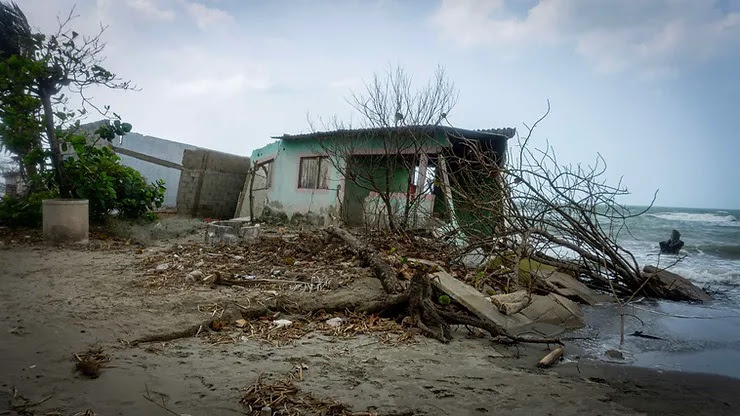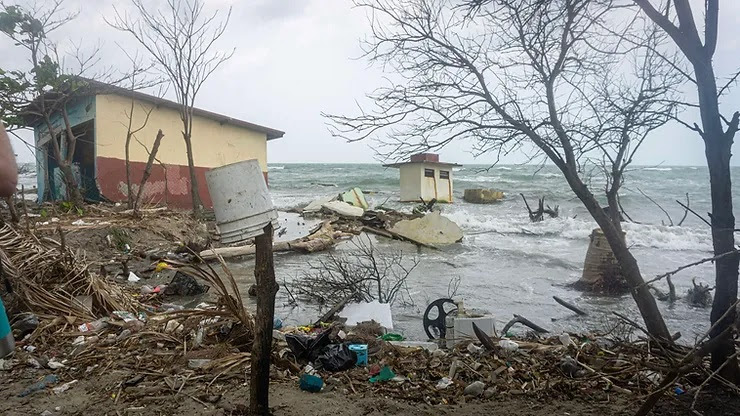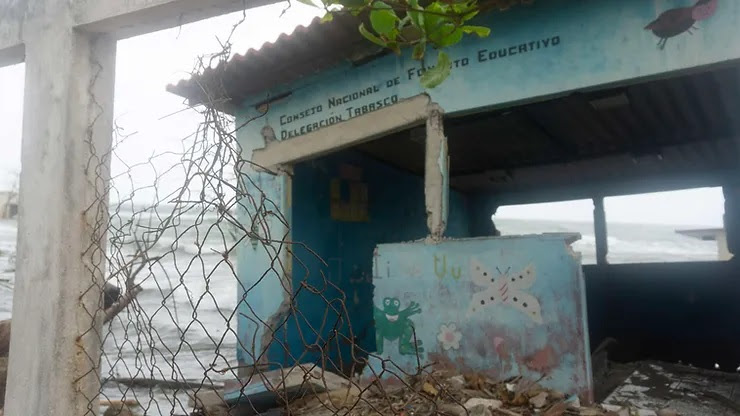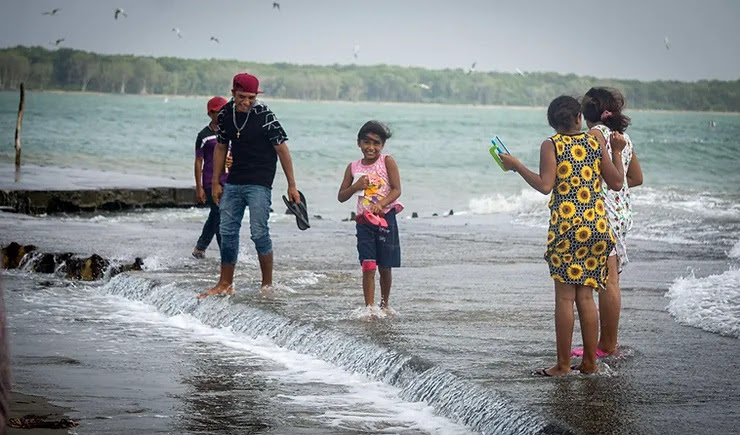Watch the video and listen to the audios here: https://radiozapatista.org/?p=44799
Text: Observatorio Memoria y Libertad
Photos: Karen Castillo – Observatorio Memoria y Libertad
Video: Anticapitalist University Network
Audio extracted from video by APIIDTT
Audio editing: Radio Zapatista
The Caravan El Sur Resiste on its fifth day of travel arrived in Colonia El Bosque, Tabasco, a community located between the Atlantic Ocean and the Grijalva River.
El Bosque is in danger of disappearing because, since 2019, the sea level began to rise rapidly, sweeping away the coast, the streets, the kindergarten and school and dozens of homes.
El Bosque is one of many communities around the world at risk of disappearing underwater due to rising sea levels caused by climate change. In Mexico, it is one of the first communities identified as displaced by this phenomenon.
Today there are few houses and buildings that survive the catastrophe in El Bosque, many families have been displaced and those who are still resisting are demanding support from the Federal Government in the face of the destruction of their community, their homes, their roots, and their entire way of life.

This is how Cristina Isabel Vicente and Estanilada Cardona explain it, as they give us a tour of the community to show us the buildings that are disappearing into the sea, and share their testimony and that of other community members who now wait for the Federal Government to comply with the relocation plan promised to the families of El Bosque in February of this year.
“On November 10, 2022 a press conference was held here in El Bosque to make known the terrible situation we live in, and that was when we began to be heard by the media and authorities. Since that press conference, there is nothing left, everything has disappeared.
What we are asking for is relocation, we have already lost our homes, we are renting, lending, we are asking for relocation. The authorities have given us an answer, they say we are going to be relocated, but they say it takes time, we are talking about at least 60 people who are in need of relocation.”
As we mentioned, El Bosque is not the only community around the world that is in danger of being devoured by the sea.
Cristina and Estanilada continue the tour of El Bosque, and we stop in front of a building that is about to collapse. Behind it, the choppy sea and the strong wind continue the process of eroding the building’s foundations. The remains of other buildings can also be seen among the waves, as well as trees and dry branches. There, Cristina explains that this building was her home.
“I want to share with you that, this one in the back, was my home… it was years of struggle to build and, unfortunately, today I no longer have a home. It is very difficult for us to be displaced, it is very difficult to be in the struggle now, but we will continue.”
Cristina joins in to relate her testimony, of what used to be home, there is nothing left; an empty space and sea waves are the only thing we can observe.
“I also lost my house, there was my house and I lost it, I was left without a house, now it’s really… without anything, you can’t see it anymore, it was left under the water.”

The Relocation Process
The few inhabitants of El Bosque who are still waiting to be relocated report that they have contact with governmental institutions, SEDATU and SEMARNAT have been in contact with the community since February 2023.
However, the families still do not have a possible date for relocation, nor do they know where they will be relocated to, much less the size of the land they will receive.
Cristina and Estanilada comment that the community hopes to be able to remain close to the sea, as they are a people who have historically been dedicated to fishing and the sea is their source of food and economic support.
“We live from fishing, that is why we want to ask if it can be in a place where we can do that, everything is worrying, very worrying, we do not know where we are going to go, nor when.
“We do talk as a community, we sit down, we talk over coffee and bread, because they say that sorrows are lighter with bread. We get very upset as a community, the nights are very worrisome, we spend our time thinking about the sea, that sea that we are already afraid is going to rise more. We have had to take things away from the people at 3am, at 4am because the sea has risen, and it really affects us as a community.”
In addition to living with the worry, day and night, that more houses and spaces will disappear under the sea, the situation of services in the community worsens day by day.
Cristina tells us that most of the families have lost the refrigerators in their homes that have broken down in the process. This not only makes it difficult for families to keep their food longer, but also makes it difficult for diabetes medicines to be kept refrigerated.
Light poles are also beginning to give way to the waves; the community could lose service to electrical access at any time.
“The whole community almost lost their refrigerators. I, who have diabetes, for example, have nowhere to keep my insulin. Yesterday I brought an ice block but I don’t know if I can bring it daily. We agree with the relocation, but we have urgent needs in the meantime.”

When talking to some people in the community, they mentioned that they understand that the relocation process can be slow and complicated; however, they hope that there can be another type of plan while they wait for it to ameliorate the crisis situation that the community is going through.
Despite the fact that the global warming process has been identified as a priority in international politics due to the impacts it will create for the security of millions of people worldwide, the Mexican Government does not have any type of plan or public policy proposal that seeks to stop this process.
According to the State Action Program for Climate Change in the State of Tabasco, “the impacts on the coastal zone of the State of Tabasco due to the accelerated rise in sea level will result in the destruction of land […] due to the action of waves. All these aspects will have notable environmental as well as social and economic repercussions.”
However, there is no plan to attend to the victims of the natural catastrophes that are already beginning to occur, as the case of the community of El Bosque suggests, and which will soon multiply throughout the national territory if the causes of the climate crisis are not addressed: the devouring capitalism that continues with a process of unlimited production at the expense of the environment and the life of all living beings on the planet.
During the tour, Cristina and Estanilada stop in front of another building in the process of collapse. This was the community’s school, the kindergarten is also gone. Now the children who are left in the community go to school only 6 hours a week in a small construction with a tin roof.
The life of the community, not only of its buildings, has also been gradually devoured by the sea.

The Loss of the Roots of a Community
Cristina and Estanilada continue leading the tour, we walk for about a kilometer; the sea is choppy and the wind blows hard; today another North entered changing the weather conditions of the place that is usually sunny and the sea is calm.
We arrived at the point where the Grijalva River meets the Atlantic Ocean. There Cristina and Estanilada stop, as well as boys, girls, teenagers, women and men from the community. There they point us to a concrete slab that is barely visible above the water.
The slab used to be a dock, and the meeting point for the entire community; families would gather there to fish, the activity that for generations has shaped the identity of the people who live there and their source of food and economy.
Today, the dock no longer exists, fishing has almost disappeared and with it, all the activities that were carried out there, as well as the livelihood of the families. This is the testimony offered by Cristina:
“We used to come most of the people to fish, this was like a tianguis, we would all come with blankets and our children would stay here asleep and we would go fishing, we would take the product to sell and in the afternoon we would go fishing again. That no longer happens, there is no longer the production that there used to be, it has been lost. This, comrades, was our roots. I feel sad, I feel that climate change is taking away our roots. It is very sad, we know that if one day a stronger north or a hurricane comes in, we can disappear overnight.
This used to be a well-structured dock, but it has been lost, sinking. Here we used to fish, we used to party. I never imagined it would happen to us, when they said climate change, it sounded like a distant voice, when I heard that I thought of the people in the city with their cars, and not of us who live without pollution. We did not cause the change, but we are going to pay for it, today it is us, but tomorrow it will be others.

However, it has been the global north that has been responsible for creating the climate crisis that we are experiencing and specifically it is the population of the global north that is responsible for making millions of dollars in profits at the cost of millions of human lives.
What is happening in El Bosque is not a spontaneous phenomenon. At a global level, the great need for public policies that place the indigenous, peasant and fishing communities at the center of the discussion on global warming has been placed at the center of the discussion.
They are the ones who have managed to protect the last lungs and natural areas preserved worldwide, and also the ones who will suffer the most from the effects of global warming.
The deep interrelationship that native peoples have with the environment of the territory they inhabit means that their identity, economy and community life are intimately linked to the survival of their territory.

Just as in Puente Madera, Oaxaca, the community explains that if the Pitillal is destroyed to build an Industrial Park since it is their current source of life, the same happens in El Bosque with the loss of fishing as a livelihood.
For this reason, governmental solutions at a global level -and in Mexico- need to be deep and at a system level; there is no life that can survive the devouring capitalism and its death machine.
We ended the visit and documentation in El Bosque with a meal prepared with effort and solidarity by the families of the community. Despite the uncertainty, pain, destruction and worry they have experienced in recent years, there is still hope, solidarity and resistance in their eyes and in their actions.
The children laugh and play in the water, the women talk and converse with each other, the community of El Bosque is resisting and fighting.
See the viedo and listen to the audios here: https://radiozapatista.org/?p=44799
Original source: https://radiozapatista.org/?p=44799 English translation by Schools for Chiapas.
